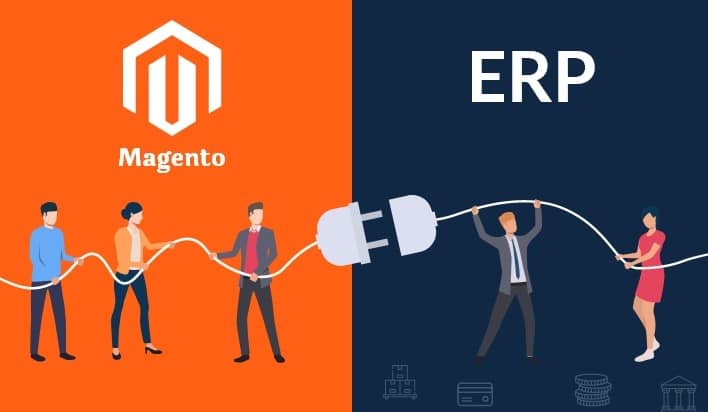In the fast-paced world of e-commerce, staying ahead requires innovative solutions. Enter Magento ERP, a game-changer that seamlessly integrates with e-commerce platforms, revolutionizing how businesses manage operations and engage with customers. This article explores the nuances of Magento ERP, its evolution, key features, benefits, challenges, successful implementations, future trends, and insights on selecting the right system for e-commerce success.
The Evolution of E-commerce and ERP Integration

The journey of e-commerce has witnessed significant transformations. From rudimentary online stores to sophisticated platforms, the need for robust solutions led to the integration of ERP systems. Magento ERP stands out as a frontrunner, enhancing the capabilities of e-commerce businesses by providing a comprehensive suite of tools for streamlined operations.
Key Features of Magento ERP
Seamless Order Management
Magento ERP excels in order management, providing businesses with a centralized system to process and fulfill orders. This feature ensures efficiency and accuracy, crucial for meeting customer expectations in the competitive e-commerce landscape.
Inventory Tracking and Control
E-commerce success hinges on effective inventory management. Magento ERP offers real-time tracking and control over inventory, reducing the risk of stockouts and overstock situations. This not only improves operational efficiency but also contributes to cost savings.
Customer Relationship Management (CRM)
Building lasting customer relationships is paramount in e-commerce. Magento ERP integrates robust CRM features, allowing businesses to understand and engage with their customers effectively. From personalized marketing to targeted communication, CRM is a cornerstone of Magento ERP.
Benefits of Implementing Magento ERP in E-commerce
Enhanced Customer Experience
Magento ERP enhances the overall customer experience by providing a seamless and efficient shopping process. From order placement to delivery, customers benefit from a smooth and transparent journey, fostering loyalty and positive reviews.
Streamlined Operations
Efficiency is the heartbeat of successful e-commerce. Magento ERP streamlines operations by automating repetitive tasks, reducing manual errors, and providing real-time insights. This not only saves time but also allows businesses to focus on strategic growth initiatives.
Real-time Data Analytics
In the dynamic e-commerce landscape, data is king. Magento ERP offers real-time data analytics, empowering businesses with actionable insights. From sales trends to customer behavior, this feature enables data-driven decision-making for sustained success.
Challenges in Implementing Magento ERP
Customization Complexities
While ERP is highly customizable, businesses may face challenges in tailoring the system to their unique needs. Overcoming these complexities requires a collaborative effort between businesses and experienced ERP consultants.
Data Migration Issues
Migrating data from existing systems to Magento can be a complex process. Ensuring a smooth transition without data loss or discrepancies is crucial. Thorough planning and expert guidance are essential to address data migration challenges.
Employee Training
Adopting a new system necessitates proper training for employees. Magento ERP’s robust features may require a learning curve. Comprehensive training programs and ongoing support are essential to ensure smooth adoption and utilization of the system.
Case Studies: Successful Magento ERP Implementations
Company A: Boosting Sales and Customer Satisfaction
By integrating ERP, Company A experienced a 30% increase in sales and a significant improvement in customer satisfaction. The streamlined order management and personalized customer interactions were key contributors to their success.
Company B: Improving Inventory Management
Struggling with inventory challenges, Company B implemented Magento to gain better control. The result was a 25% reduction in excess inventory, leading to cost savings and improved overall operational efficiency.
Future Trends in Magento ERP
AI and Machine Learning Integration
The future of Magento involves deeper integration with artificial intelligence and machine learning. These technologies will enhance personalization, automate decision-making processes, and provide predictive analytics for e-commerce businesses.
Mobile Commerce Advancements
As mobile commerce continues to surge, Magento is adapting to provide enhanced mobile experiences. From mobile-friendly interfaces to advanced app integrations, the system ensures businesses remain accessible to customers on the go.
Selecting the Right Magento ERP System
Considerations for E-commerce Businesses
Choosing the right ERP system requires considering the specific needs of e-commerce businesses. Factors such as scalability, customization options, and integration capabilities should be carefully evaluated.
Scalability and Flexibility
E-commerce businesses are dynamic, and their ERP system should be able to grow with them. Scalability and flexibility are crucial considerations to ensure that the chosen Magento ERP system can adapt to changing business requirements.
Realizing the Full Potential of Magento ERP
User Adoption Strategies
Success with Magento hinges on user adoption. Businesses should implement comprehensive user training programs, ensuring that employees are comfortable and confident in using the system to its full potential.
Continuous Improvement Approaches
ERP is not a static solution but a dynamic process. Businesses should adopt continuous improvement strategies, incorporating user feedback and staying abreast of updates to maximize the benefits of the system.
Conclusion
In conclusion, Magento is a catalyst for e-commerce success. Its impact on customer experience, operational efficiency, and data-driven decision-making is unparalleled. As e-commerce businesses navigate the challenges and opportunities of the digital era, embracing ERP becomes not just an option but a strategic imperative for those aiming to thrive in the competitive landscape.